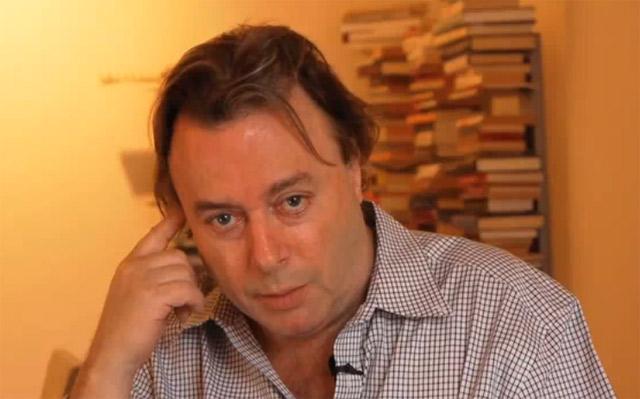I’ve been reading stories about and obituaries of Christopher Hitchens these past few days.
I was amazed how much I laughed—out loud.
I mean no disrespect toward the noted writer, literary critic, verbal bomb-thrower, bane of organized religion, outrageous and
iconoclastic savager of the whole band-width of ideology and political rhetoric, who was, above all, a very serious man. His opinions and pronouncements were principled, well thought-out to the point of almost being irrefutable and passionately held.
But by God — okay, perhaps not by God — he could be and was funny in his writing, on the air, in debates and interviews and probably in his sleep. And I mean funny as in deadly serious funny. He died last week at the young age of 62 of pneumonia, and the effects of cancer of the esophagus. Put another way, he probably died of the way he lived, or rather the effects of his mammoth indulgent drinking and smoking.
He probably would have abided by that judgement, but not the one in which some mean-spirited religious types insisted he was being punished by you know who. He was towards his last days astonished by the amount of communications offering him prayers, but also urging him to repent and recognize God.
Hitchens suggested if that should somehow happen it would be from the effects of his illness, not a recantation.
He talked (and wrote) about the subject of his dying days on talk shows and his recent autobiography boldly titled “Hitch 22”. “I could not imagine seeing a good religionist on his death bed and screaming in ear that there was no afterlife, no nothing. That would be unethical,” he said.
Among the many entries in the comment sections of stories about his death there was this: “Just this once, I will admit I am not great.” God.
Hitchens became known a little late in his life as an atheist, with arguments aplenty to prove that he was right, including a book called “God is Not Great”. But he backed his arguments with his keen wit and intelligence, and it would always seem that in religious arguments, faith might trump reason, but reason holds the info cards.
What Hitchens despised was the intolerance, the violence against other religions that was practiced by fanatical religious adherents and fundamentalists, especially the most radical of Islamic believers who committed acts of terror and murdered in the name of their religion. He also attacked Mother Theresa. He loudly and bravely blasted the fatwa issued by the Ayatollah Khomeini against Iranian author Salman Rushdie for his novel, “The Satanic Verses.” He was in all his opinions and writings, an equal-opportunity critic, offending friends and enemies on the left and right. And I think he was a brave man—he reported for the Nation and later Vanity Fair from war zones and once underwent waterboarding personally to be able to write about it first hand. “If this is not torture,” he wrote, “then there is no torture.”
He was a brilliant and elegant, if sometimes brutish, essayist, a keen literary critic, and by all-accounts, non-stop talker, sober or not.
As somebody noted that if you’re a famous and respected writer, you’re bound to get good notices when you die. He got good notices from really good people all of his life. On the publication of “Hitch 22,” the great English novelist Ian McEwan wrote that “If Hitchens didn’t exist, we wouldn’t be able to invent him.” Richard Dawkins wrote “If you are invited
to debate … with Christopher Hitchens, decline. His witty repartee, his ready-access store of historical quotations, his bookish eloquence, his effortless flow of well formed words … would threaten your arguments even if you had good ones to deploy.”
I saw Hitchens once at a faux debate at the Shakespeare Theatre in Harman Hall, where, I believe a Supreme Court justice, several media pundits, historians and Arianna Huffington as well as Hitch debated the issue of whether Henry V’s invasion of France which resulted in the battle of Agincourt was a war crime or legal. I don’t remember the outcome, but I do remember Hitchens, apropos of nothing except that Shakespeare’s ghost was in the house, gave a perfectly vivid description of Edward II’s horrific murder (from a play by Marlowe), which left even Huffington silent for a second or two.
This is the kind of thing Hitchens could be counted on to do: whatever came out of his mouth, would come out in perfectly formed sentences, it would often be risible and offensive, and dead-on in the
facts.
He was on Bill Maher’s show at least once, because Maher, you suspect, saw him as a kindred spirit because Maher flayed against people of faith religiously on his show, in the manner of a petulant boy whose favorite insult is “redneck,” a peevish boy who had obviously been hit on the knuckles with a rule by a nun in his childhood. On that occasion, Maher might have been forced to believe that there was a higher being, because he was sitting next to one.
VACLAV HAVEL
Hitchens, unlike writers like Jimmy Breslin or Norman Mailer in America, never aspired to public office, high or low, because the tradeoff is inevitably a piece of your soul.
In other countries, especially in the latter part of the 20th century, during the time of the Cold War and the relatively imminent breakup
of the Soviet Union and its Eastern Europe, things sometimes were different.
The dissident, writer and playwright Vaclav Havel , who died at 75 on Dec. 17, would become president of what was then Czechoslovakia and later became president of the Czech Republic when the country split in two with Slovakia becoming a separate country.
In all cases, Havel was first and foremost an eloquent dissident and provocateur in a country where creativity and dreams of freedom burned
strongly even in the darkest hours when the Soviet Union crushed the Prague Spring in 1968 with an invasion of tanks into Prague.
Havel was a prolific playwright and prolific and open dissident which caused his writings to be banned, which caused him to be arrested and land in prison. He was a hero throughout the world for his defiant stance, and his plays were performed often in the United States and frequently by Scena Theater under its director Robert McNamara in Washington, D.C.
His letters to his wife published under the title of “Letters to Olga” were widely praised for their moral resonance and example.
Writers or artists, of course, don’t always make good presidents. The presidency in the Czech Republic, as it is in other European countries,
is large ceremonial and symbolic, but as a symbol to his country Havel filled the job. As a president per se, Havel was a very good playwright.
A noted filmmaker was visiting in Washington during the D.C. Film Festival at the time of Havel’s ascendancy to the presidency and passed on this story to me. “Someone told Havel that people were already making jokes about him,” he said. “And Havel said ‘Jokes? About me? But I’m the
president.’ ” “Yes,” he was told, “That’s the joke.”
Havel reportedly found that joke funny. But then, he would, because he was a serious man.
- Christopher Hitchens




